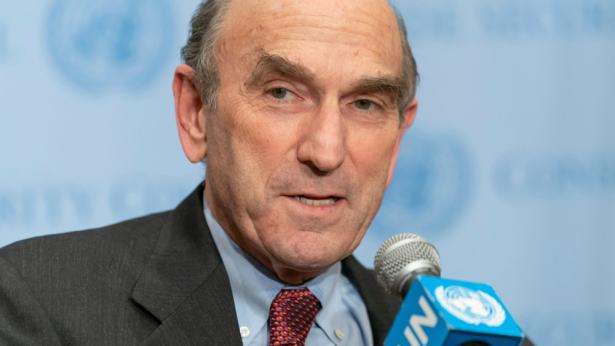In the 1980s, I witnessed the devastating impact of U.S.-sponsored violence on innocent civilians during humanitarian and solidarity trips to El Salvador. The scars of that dark period, which the United States have never formally taken responsibility for, still haunt the people of El Salvador today. Now, four decades later, we have an opportunity to hold Elliott Abrams—a chief architect of that conflict—to account for the atrocities he helped create and cover up.
Abrams was recently nominated by President Joe Biden to chair the U.S. Advisory Commission on Public Diplomacy, a public relations post whose goal is to shape international perceptions about the United States. It’s appalling that Abrams, a former member of the Trump and Reagan Administrations, can still be seen as a respectable candidate for any public office, much less one that’s involved with diplomacy. It is still not too late, however, for Congress—the same body that Abrams lied to about the Iran-Contra Affair—to correct course by showing him the door.
One of the most glaring stains on Abrams’s record is his involvement in the El Mozote Massacre, a horrifying atrocity during which around 1,000 innocent civilians, including 195 children, were brutally killed.
Having witnessed the atrocities as a nurse documenting human rights abuses for the United Nations in 1985, I can attest to the heart-wrenching reality of the systematic pattern of torture, disappearance and assassination that unfolded in El Salvador. Bodies were left in the streets as a gruesome means of terrorizing the populace.
El Mozote, we soon learned, was only a part of a much larger campaign to drive rural communities from their homes. The Salvadoran and U.S. military strategy, which Abrams had helped formulate, was to drain the sea to kill the fish.
Abrams shamefully dismissed these reports as mere communist propaganda before the Senate Foreign Relations Committee on February 8, 1982. In the Salvadoran civil war, 75,000 lives were lost. In 2019, he described U.S. policy during this time in El Salvador as a “fabulous achievement.”
Abrams’ troubling track record does not stop there. He faced legal consequences for withholding information from Congress in 1986 during the Iran-Contra affair, an act that raises serious doubts about his honesty and trustworthiness.
Three years before, Abrams had lent support to the Guatemalan military dictator Efraín Ríos Montt, who was later convicted for genocide and crimes against humanity during the Guatemalan civil war. Abrams’s advocacy was crucial in ending the weapons embargo that had been instituted by the Carter Administration in response to Montt’s human rights record—making him complicit in a legally-defined genocide.
Additionally, his stance against an independent Palestinian state, coupled with advocacy for Israeli expansionist policies and illegal settlements in the West Bank, reveals a consistent pattern of disregard for human rights and international law. Abrams has also played a role in some of the most destructive foreign policy decisions and wars in Venezuela, Libya, Iran and Iraq.
We must call for accountability. The U.S. Senate must reject Abrams’ nomination. Diplomacy should be guided by individuals who prioritize human rights, transparency and accountability, not by those who have enabled atrocities committed by foreign governments.
Nominations often entail political considerations, but I implore Biden to rise above partisanship. Upholding the integrity of U.S. diplomacy means appointing individuals committed to peace and human rights. We can no longer compromise on these principles. It’s time to put our values first and ensure that the voices of those most affected by U.S.-sponsored violence do not go unheard.
Marc Rosenthal is a retired ER Nurse who has been involved in international solidarity for over fifty years. He is a co-founder of the U.S.-El Salvador Sister City Network.
This column was produced for Progressive Perspectives, a project of The Progressive magazine, and distributed by Tribune News Service.
Since 1909, The Progressive has aimed to amplify voices of dissent and those under-represented in the mainstream, with a goal of championing grassroots progressive politics. Our bedrock values are nonviolence and freedom of speech.
Based in Madison, Wisconsin, we publish on national politics, culture, and events including U.S. foreign policy; we also focus on issues of particular importance to the heartland. Two flagship projects of The Progressive include Public School Shakedown, which covers efforts to resist the privatization of public education, and The Progressive Media Project, aiming to diversify our nation’s op-ed pages. We are a 501(c)(3) nonprofit organization.


Spread the word